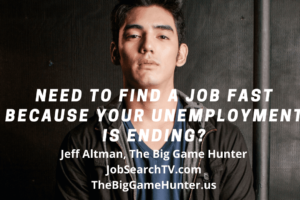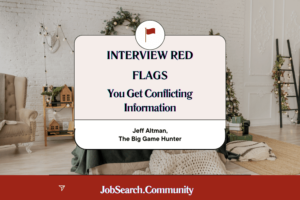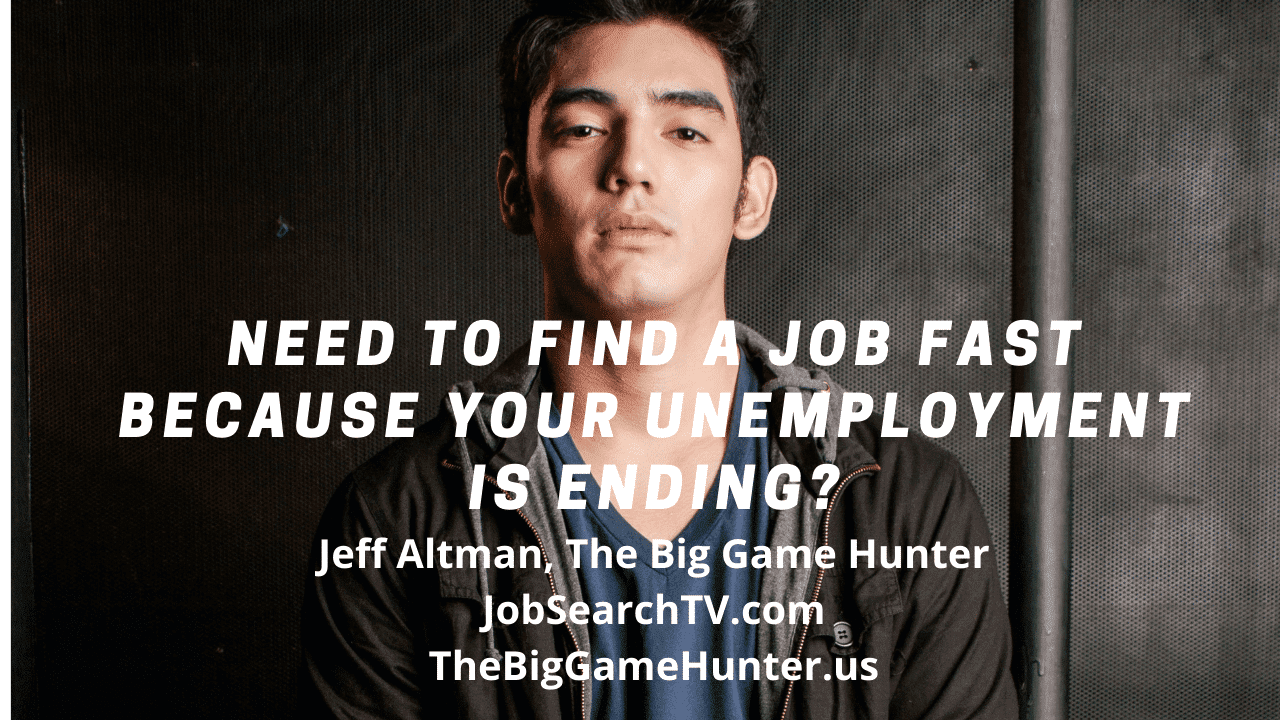Until someone comes up with a better way, interviews are how firms evaluate people. My guest, Christine Campbell and I, discuss things people do wrong and how to respond to behavioral interview questions.
Jeff Altman
So my guest today is Christine Campbell. Christine is a job search and interview coach with an MA in career development and experience working with career counseling clients course many fields and industries, most of whom work in Silicon Valley, up to and including a director level. Her expertise is coaching professionals to create powerful stories to address behavioral interview questions so that she could walk into interviews feeling prepared. Christine, welcome. Thank you for making time today.
Christine Campbell
This is so great. Thank you so much for having me, Jeff.
Jeff Altman
My pleasure, folks, we’re gonna have fun today. I know this already. So you started in career counseling, since transition and interview coaching, what made you segue into job interview coaching.
Christine Campbell
I feel like that’s the biggest ROI. Besides the resume, where just an hour with a good coach can take a job seeker to the next level, you know, you can go from horrible to bad from bad to Okay, from okay to good. And from good to great. And even from gray to excellent sometimes with just a couple of tweaks. And so I feel like that’s, that’s time well spent for me. And I also, I also enjoyed doing job search coaching, just tricks and strategies, because I’m bossy, and I like to tell people what to do, rather than you know, your traditional coach, just as mostly a good listener and asking questions and pulling things out of people. So this suits my personality. And if you do the same thing over and over and over again, right, you get good at it. And so I really, I really enjoy that I have I, I outsource resume writing and assessments. And you know, the deeper side of career counseling, when somebody comes to me says, Gosh, I really want to get out of my field. I’m like, let me point you to Jeff. Right, let me, right? So you know, that’s the nice thing is that we get to specialize and find with all careers, right, get on the right bus and then find the right seat.
Jeff Altman
So true. And you talked about the typical coach, she basically, I don’t wanna say the passive, but the coach training basically says, you have all the answers. And in job search and interviewing. That’s not true.
Christine Campbell
But people think it’s all common sense. But I think people often under some people underestimate the amount of common sense that they have. They’re also not the most coachable.
Jeff Altman
I find they come to me because they want answers to their questions. They want a model to work with, that’s going to get them the results that they want. And they’re figuring it out on their own. They’re up against roadblocks, and they’re hitting their head against the wall. And they’re like a bird going help me. Help me.
Christine Campbell
Well, that’s for me, I find I I make have the biggest impact, I am most helpful for people who either have bombed job interviews and who are just getting desperate, or somebody who keeps coming in second or third, but never first. Or of course, somebody who has a high stakes interview coming up with a fan or you know, a job that they really, really want. So those are the three types of people who are the most open to input and easiest to work with and who will make the biggest improvement in their in their ability to integrate well.
Jeff Altman
So let’s dive in. Okay, so what do you find people do?
Christine Campbell
What do people do wrong? People everything
Jeff Altman
I know everything.
Christine Campbell
Oh, no, no, no, I mean, I think the first thing is right, the assumption that just because you’re a good conversationalist, and you know how to have good conversations that it makes you automatically good interview we there’s an art to it. And obviously preparation you know, deep dive into research don’t just go to the website of the company, dig deeper if you have ability to get into Dun and Bradstreet find out about the finances and their competitors and just really really become an expert in the company you’re interviewing with.
Jeff Altman
The trick question here? Yeah. Why? Why?
Christine Campbell
Okay, well so you want to build rapport right? A you want it you want to a it makes you feel better, it makes you feel confident when you feel prepared, not just about your own stuff about them. You come across as intelligent also, you know, as you want to show with somebody who prepares and is knowledgeable and who did the work and, and to demonstrate I care about this interview enough that I spent a couple of hours being prepared and so they also they can ask better questions, right? You know, I’ve heard of people asking so what exactly do you do here? Like, what am I Waste of time, right? So that’s short. Right? Right. So that’s the first one not being prepared. And again, I focus mostly on behavioral questions, telling stories that don’t have a positive result. Right? You know, you want to make sure that when you tell a story that demonstrates you either increased revenue for the company, you decreased expenses, you created efficiencies and save time, or creative harmony, sometimes stories can have more than one component in them. If your story doesn’t have one of those four end results. It’s not impressive, right?
Should I Confirm an Interview?
Jeff Altman
Once you repeat them again, okay?
Christine Campbell
Okay. So, the first one is, have you made money for the company? Ideally, always, like with a resume, you want to throw some numbers in there increased revenue in the first year by 10%, or by 10 million, the more quantity, the more you can quantify it, the more powerful it’s going to be. Were you able to save the money, you know, reduced expenses in this department by 10%? In the first three months, right, created efficiencies, cut the time down for this process by from from a month to a week? That’s really impressive. And the fourth one, create harmony, can you tell a story where there was a really, really difficult manager who was hated by everybody, and and you were able to figure out why they are that way. Get along with them, and then coach your co workers and how to interact with person with a person so that projects runs more smoothly. All of those things are right, impressive. So you want to impress the interviewer with a good result.
Jeff Altman
Interesting. So we have the not be ready with stories not having done researching. First, we’re gonna do a deeper dive into stories in a minute. I want to get a couple more because I do a lot of interview coaching as well. I like to hear what other people do. It’s awful to me as well. Absolutely. So what are the mistakes that people said,
Christine Campbell
they forget to mention the hardship, I find that that is, you know, in your, in your interview with Mr. David Watt, what what you talked about, you know, star and sore and par, etc, etc. I find that in order to be truly memorable, and really impress people by behavior, interviewing of you questions are all aimed at finding out your soft skills. And a huge, soft skill that I want to have if I’m hiring an employee is are they good problem solver? How do they deal with adversity? How do they, how much grit do they have? What’s their influence management? So a lot of people when they interview gloss over the difficulties and they say, Well, this was the situation. And then I did this and this and this and this and as a result, blah, and it’s boring, right? And it’s not impressive. You don’t really get the juicy, soft skills out of that. And when I coached my clients, I said, please bring me the suffering. Tell me the hardship. Tell me about all the problems you had to overcome. Your budget was slashed. Your coworker had to go on medical leave, you had a really you somebody was sabotaging you. I had one candidate that I coached and he went on an interview and he called me the next day. He said, Well, Christine, he said it was incredible. The interview was kind of rolling along. And the interviewer was just kind of leaning back and asking questions. And then when they asked me behavior interview question, and I said oh, and the problems we encounter, he said, the interviewer physically leaned forward, and was wrapped with attention, because suddenly, people love drama. And that’s what will make you stand out from the other candidates. And then you can show your super skilled superhero skills and then produce the great result. But if you gloss over the hardship, you’re doing yourself a disservice.
Jeff Altman
There’s a an interview I did. Last year, I believe it’s, it’s called, there are stories. And then there are stories. And he writes for TV. So if you think about the model, for TV, there’s always some crisis that occurs. And the world is about to be destroyed. Like I used to know joke with friends of mine, that most movie plots were developed by software, because they’re so predictable. Everyone’s having a good time. And suddenly the world is going to end and our heroes get into the spaceship fly. And of course, there’s a problem on the ship at some point. And the female scientist and the male goon something they’re going to be attracted to one another. It used to be the other way around. It used to be the male sciences. But no matter these days, just the female scientist and the male gewoon are going to be attracted to one another, and they’re going to persevere and save the class,
Christine Campbell
almost dying in the process at least once. And at
Jeff Altman
the end, it’s like a James Bond movie where he and the girl would apparently wind up in the rest. Right, right. So we want to have stories that really touched the emotional heartstrings of people. Yeah, wherever we can really make a difference.
Christine Campbell
Yeah, you want the person say, Wow, that sounds really, really hard. And then and then when they listen to how you solved it, they they want you want to impress them with how you overcame hardship.
Jeff Altman
It’s like every story we read to kids. It’s a fairy story, Once Upon a Time assigned to a group. And in this group, there were 18 people, four of whom were competent. You took over from a manager who left suddenly, that project was three months late, and you had to get it delivered on time in the next 45 days.
Leadership During Times of Extreme Fear
Christine Campbell
Exactly. We want to hear that your risk, they want to hear that you’re resourceful. And and you know, because I usually behavior interview questions, ideally come towards the end, after which it’s already been established that you’re, you know, you’ve answered the technical question. And you’ve established that you’re smart and competent, and know your stuff. And the behavioral interviews, stories, in addition to just soft skills, also then allow you to talk about what tactics you’ve used, right? What, what, what, and then sometimes saying, Oh, my God, I had no idea what to do. And then I did some research. And I figured I found this great program here that bla bla bla bla bla bla bla, but yeah, it shows your thinking and and how how resourceful you are. And that’s what you wanted any employee no matter what the level, right.
Jeff Altman
And one of the funding, I had to write an article about this today, it’ll be out tomorrow, about dealing with fear as a leader. Because normally, when you’re stepping into situations like that there’s some version of the crisis. That’s really what we’re talking about in terms of obstacles that take place, there’s a crisis that causes everyone to be afraid this thing is blown. And that’s the way you tell the story is to illustrate the crisis that took place. And then from there, how you were the hero who wrote in on the horse? Family 60 minutes later, the camera shut up. She seems like everything’s okay. Right? Everything
Christine Campbell
and or not? Or was it or one can say, Well, okay, I’ve been holding this together. And I’m so glad the calorie has arrived. Now let’s together take it to the end, right. Also, another mistake that people made either. Either they talk about we as a team, we as a team, we as a team, and I cannot tell as the listener, what was your part or II. So you want to make sure that when you tell your stories, you say, you know, my team and this this, and this is what I did. And this is what we did to have have both to make sure that that it’s understood that you work with others, as well as their Lone Ranger’s don’t do too well in corporations.
Jeff Altman
Not at certain levels. They know it’s the way people ascend most of the time as being Lone Ranger’s. But they get to a level, it’s really about how you inspire teams to do great work.
Christine Campbell
Well, but even software engineers, they have regular meetings where they have to figure out together, you know, who’s working on what, and what are you doing, and where you’re stuck? And what do we got to do? Even even even in those jobs? You’re, you know, no, no, no person has an island, right?
Jeff Altman
So let’s talk, use an example of stories and how you do a framework for folks in telling the story. So I’m going to toss the baton to you, you’re in charge of telling people how to construct the stories.
Christine Campbell
Yes, and, and I was just listening to your, the interview you did with David Watts about and you and you actually parsed out that read, there’s the STAR method method, there’s the SOAR method, and that the there’s the PSR or the PA r method, and I found that interesting, I tend to go for the sore or the par methods only and I’ll spell those out. But you You did a great job saying you know, if you’re at this level, you use this etc, etc. So the STAR method stands for a situation,
Jeff Altman
tactic or situation task is has to be situation or task Action Result. It’s geared towards staff people primarily. Yeah, Amazon likes this framework as the exception where they wanted to associate with everything.
Christine Campbell
Google Google as well I have I have candidates who were told by Google before the interview, please be prepared to to to tell your stories using the star format. I prefer like so what I was talking about earlier about the hardship etc, etc. So you know, Mostly it’s the sore methods, the suit the situation, obstacles, action and result. And then we also and then the shorter version of that is part the problem, or PSR. problem, solution result. I mean, they’re all similar. But you know, as we, as we talked about a couple of minutes ago, you really don’t want to gloss over the obstacle. Part, because you’re missing something juicy. Juicy, right in this
Jeff Altman
context, so they understand what it was that you really did and the hardships that you face.
When You’ve Been Made Redundant, Fired, Laid Off, RIF’d
Christine Campbell
Yeah. So So when somebody calls me and says, Oh, my God, I need help. I’ve been bombing interviews, what I do is on the phone first, you know, that during the free consultation, I explained all of this to them, I said, Please prepare five stories. And so here’s the other kicker, as you’re preparing your stories, you start, you start with your biggest successes. So I have them think about the five biggest career successes they found, and it doesn’t have to be recent, it can be 10 years ago, or 15 years ago, but tell me about a huge success in your career. And then let’s roll it backwards. Because there were there was hardship. And there were obstacles and problems in there. And then you parse that out. And then afterwards, you you you’re on your, you know, online, you know, on a piece of paper or in a computer, you then write what was the situation? What was were the obstacles? What did you and your team do? And what was that result? You know, that make money, save money, create efficiencies, and increase and create harmony? And then afterwards, and then I asked them, What soft skills are you demonstrating here? And what behavioral questions could this story be answering right? Is this a story about? Tell me about a time you had a difficult coworker? Difficult manager a difficult where there was a breakdown in a project where you made a mistake? Or my favorite? You know, I do love in the interview with somebody asks, tell me about your biggest career success? Because that right, that shows you know that get that? It’s a great question, because it allows the person to talk about their biggest triumph and they get to light up. And and do you want to hear that somebody had an outstanding success? So then, then, so I have my clients write out a couple of stories like that, and then an RS zoom session. I said, Okay, I’ll throw a question at them, and then have them tell me their story. And then I said, Okay, perfect. So what what really worked really well was this, this and this, but let’s tweak this, let’s, let’s I want give me more hardship, or Hello, let’s quantify the results. And then afterwards, after our session, we do that with a couple of questions. And then they go home, and then they have enough information that they can continue creating more stories and fine tuning the stories and then we meet again, and we’ll keep practicing until either they have it in their body, or they have an interview in it, and they land the job often after just a session or two, I get an email saying I got the job. And you know, that’s, that’s what makes our heart sing.
Jeff Altman
You betcha. And I want to couple this part with some of the work that I do, which is I believe that most job descriptions are 80% accurate, because no one ever takes the time to update. So with that, when you arrive at an interview, whether in person or zoom, or however, I believe that you start off the interview by saying, hey, thanks so much for making time to meet with me. You know, I recall the position description, but I want to get your take on the role. Could you tell me about the job as you see it and what I could do to help. And thus you hear about what their thoughts are about the job at the beginning of the interview? Yes, so everything is about connecting the dots with what they’re looking for. And that includes your stories, which you can have prepared. But folks, you got to be able to think on your feet, especially those of you who are aspiring to leadership or who are in leadership. So in Christine’s approach, which I use as well, by the way, you know, the idea is, once you have what they’re looking for, now you’re going to adapt the story to connect the dots for them. And the less you make them work to figure out how you’ve done what they need you to do, the more likely you are to get hired.
Christine Campbell
Absolutely. And what is so awesome about zoom interviews is you can tape a cheat sheet with a heading of your stories right next to the computer screen so that you don’t you’ll have deer in the headlight moments. So if somebody asks you a difficult question, you can just look to the right and go. I can tell this story now. So it makes it so much easier than having to do that live in the moment across the table.
Jeff Altman
You betcha I tell people to this is one of the Few times I tell people by sticky notes, because if I put my finger over the camera, you can see my finger. But if I put it to the right where you tell people put the sticky note, or to the left, you can see that my fingers there. And thus, that’s where the sticky notes go. So you don’t have to break eye contact to look down or to the side, you just basically are switching over slightly, and getting the note in front of you to be able to see what your answer should be. Or you can
Christine Campbell
even like right now I have the zoom doesn’t fill my screen, it just it Fields up 1/3 In the middle, you can even have a document on both sides squeeze together and have a typed out. And then you can even get the more information on there. And it’s nice and clean and tidy. So So I love zoom interviews, because that way you can it just makes it easier to because people are you know, you’re nervous. And sometimes our brains go blank.
Video Interview Myths
Jeff Altman
If you’re dealing with one of those old fashioned firms that wants to do it by phone, even better, it’s best of all, because they can’t see you. That, however is your voice is your sales tool. And thus, your voice can sound flat and monotone. It has to be passionate and engaged and excited. And you have to sound like an actor on the stage on screen. Because you’re selling your lines. Absolutely. Try to be personally persuasive, and communicating with people.
Christine Campbell
So don’t over caffeinate, right, just you know, make sure you’re grounded. Make sure you’re super nervous. You walk around the block before the interview so that you can come to center and just kind of, you know, calm down.
Jeff Altman
I’ll tell people to go to the gym beforehand. Get on a treadmill or elliptical, get a run in do something that gets your heart rate going but also doesn’t give you the caffeinated edge before the interview.
Christine Campbell
Yeah, can I answer? Go back to your question, what are some things people do wrong? Worse, right? So, so you and I are both strong personalities, we are not passive people. So for us, it’s natural that if somebody were to if we were to if somebody were to interview us for a job, we wouldn’t just passively sit there and answer the questions, right? Like what you said earlier that, you know, the first question you ask us, tell me about the job descript? You know, how do you see the job, I always if you know, you have to use your your also your intuition. Some some interviewers want to be in charge, and they only have 20 minutes, and they have the 20 questions to get through. So it’s so so in that case, you do have to just comply and just go with it. But if it’s a little bit more, easygoing, make it a conversation, make it a two way street, because it is a two way street, right. And you want to get as much information out of them as they want to, as they want to get out of you. And so whenever I get asked a question as a job seeker that usually prompts me to then ask a question back, you know, I think the most number one most important question people need to ask is, what are the biggest challenge for your department right now? What are the biggest challenges? Ideally, you already know about the biggest challenges of the company? Because if it’s a larger company, then you right? We know what that Tesla’s biggest, as far right now, but it’s a smaller company that’s harder. So I just a couple of days ago, in my newsfeed, I found a great article 20 Great job interview questions to ask the interviewer. And I thought that was just brilliant. We don’t spend enough time preparing for the interview and thinking about what questions we can ask them. So that took some of the, you know, having to brainstorm out of it. But make sure you ask don’t wait until the very end to ask questions. See if you can if and get permission from the interviewer to make it turn into dialogue and get your questions in as you’re talking about a particular subject because it’s a it’s much more natural. And be it shows how engaged and interested you are.
Increase Your Chances of Getting a Response to Your Application
Jeff Altman
I think when most people interview, there’s a distinct power differential that exists where they have all the information. And you are the supplicant. Right? And I know asking my opening question levels, the playing field, because suddenly you have information that you’d normally get in a typical interview at the end where they go, so do you have any questions for us? And of course, you’re going to ask about the job then when it’s too late to do anything with that information anyway. Yeah, so I think my approach to this is designed to level the playing field and to turn it into a conversation instead of like the salesperson walking in with their I’m gonna make this like Willy Loman Death of a Salesman. So let me open up my briefcase and sell you everything I’ve gotten there. No, okay. Loss. Instead, you’re doing what good salespeople do these phase. And that is tell me about what you need or what you’re looking for. Let’s do requirements gathering. So this way you can tell your answers and talk about what you’ve done that matters to them, and not just talk about what you’ve done, which is different things.
Christine Campbell
Yeah. And asking upfront, how much time do we have? And also getting a sense, right. And I know that might be a maturity thing, a friend of mine got trapped. She was giving really great answers, long answers and asked lots of questions. And afterwards, she got the interview, he was a young young kid, completely green behind their ears, and heat. He was the pre qualifier. And, and he said, Sorry, you didn’t pass this phase, because I had 30 questions I needed to get through. But you talked so long that I only got through my 15 questions and like, Well, why didn’t you say so? Right. It’s like, that’s a bad interviewer set expectation at the beginning. But also as the interview my friend learned from that to ask better questions at the beginning, and to have a sense what what is the interview worse agenda and also understanding the different phases? Interview phases? Right? If you’re Is it a preschool? Is it a very short pre screen interview over the phone? Well, you you’re not going to be talking about your difficult manager. And you’re going to the conversation with the recruiter is going to be different and shorter than the actual conversation with the hiring manager. And you’re going to ask different questions of team members than you would of the of the VP. So just being mindful of this, the various levels of interviewers that you’re going to encounter and being mindful about about that, but just ask. people will tell you.
Can I Walk Out on an Interview?
Jeff Altman
I think with Zoom interviews, it’s easy, because you’re scheduled for a certain amount of time. You’ve gotten the calendar invite, it says nine to 9:30. You know, it’s a 30 minute interview, and with the screener, the corporate recruiter, they’ve got a checklist of things that the hiring managers told them to check off, I guess, have you done this? Yes. How’d you go about it? 60 seconds answer tops. Right. Have you done that? Oh, okay. Let’s go to the next one. Have you done this? Yes. Okay, keep going. And I’m a believer that you try to keep the interview interactive. So AB a minute 15 If you slip no more than a minute 30 Because no one has an attention span from
Christine Campbell
when you see the person’s eyes rolling their head stop right. I paid about pay attention read body language
Jeff Altman
their eyes glaze over look in their mouth like they’ve just stifled the yarn in the chair problems change the energy in the room and things up because you’ve been talking much too much.
Christine Campbell
Yeah, ask a question right that immediately you know Tony Robbins induced a state change if it’s not if the if the emotion is in the room if the other person is becoming catatonic. Find a way to change their state and and jar them and you know, ask them a question that’ll wake them up.
Jeff Altman
That’s a fun approach. I have to do something the Tony Robbins method of interviewing.
Christine Campbell
Oh, my God, go get them
Jeff Altman
a fun way of son approach to a topic. Anyway. What else? Haven’t we covered yet that we really should in storytelling and behavioral interviews and things that people do wrong? I
From Paycheck to Purpose
Christine Campbell
think we may have headed over, obviously, the obvious one, follow up with a thank you email, right to everybody, you know, maybe you know, email, you know, you want to make sure everybody’s included in that. And also, as your last question, ask about what is the process? What is the rest of the interviewing process? What are the next steps so that you are not, you’re not like sitting at the edge of the street, they see that they they already know that they have three more candidates to talk to and that their goal is to take the next me and maybe to not interview for another week or two etc to they already have a sense, but they might not they might forget to tell you always ask what’s what are the next step and just and to get permission? If I have not heard from you in a week? May I check in? Right? Because then if you get permission from them, they and they usually will say Oh, of course and you know, it’s like well, should I talk to the recruiter what? How should they contact you? Right? That’s the sales technique. Always, always, always get permission to check in if you haven’t heard back and people either are shy about it. There’s so much ghosting going on in both directions right now. So if you have permission, people are shy that you know my candidates call me and they’re like, I haven’t heard in two weeks. What should I do like well call the recruiter right. Call the recruiter and and leave one message you emailed them. And then if they don’t answer, you know, stay on it for us every three days and then every week, etc, etc, don’t become a total nuisance because they are often getting ghosted by the sometimes they get ghosted by the hiring manager. But right, take the power back and ask them what is the rest of the process. One of my candidates was interviewing with a super amazing high tech company, and they had the process online. And you can see five candidates in the first round four candidates, the next etc. This is where you are, it’s and so she could go on to the system every day and could see when people got eliminated. And she made it to the very second to last round. And then she got eliminated, but it was very Glasnost, it was completely the process was so transparent. And that was so helpful, because it’s nerve racking, right? It’s interviewing it’s there’s so so much at stake, that I’m hoping companies will eventually kind of wake up to the to, if I’m interviewing somewhere, and it is a traumatic, horrible experience, frankly, if I can, I’ll walk away from that. Right. And if
Jeff Altman
at least 20 people want a bad experience. Yeah,
Christine Campbell
Absolutely. And if the hiring manager is unpleasant, I don’t want to work for them. Right. So so right, it’s it’s it’s a it’s a job seekers job market right now. So you know, I think I’m hoping that employers start waking up to the fact that if, you know, just goes both ways.
Jeff Altman
And for me, by the way, I do that question about state where we are in the process with the process like I do. That’s my next to last question. So when they when they asked, So do you have any questions for us? Next? Last question is, could you give me a sense of what your timeline is for next steps? And when I might hear back, and I tell folks, you tend to be three responses. The first one is get 20 more people to talk to get back in touch when hell freezes over. That’s one luck. The second, I’d expect to early part of next week, which is okay. So if I haven’t heard from you by Wednesday, Thursday’s, okay, if I follow up. And there’s two responses to that, which is Wait, which tells you you didn’t do quite that? Well, but that’s a signal to you. Because otherwise they’d say, Sure, no problem. And the third response that you might get is expect the early part of next week, you’ll hear from nature, other ones, because you get back to me so and so and so and so the more specificity you get, the more likely they’re interested. And then the final question I have people ask is, is there anything that you’ve heard, or not heard? That gives you a reason to question whether you’re qualified to do this? Wow, which gives people one last cut at dispelling any erroneous assumptions that a firm is making? Because sometimes, again, I work with the assumption that hiring managers not all that skillful interview, right, the sample proof than that, but I know they’re not all that skill. So sometimes they ask a question, especially with the tech firms that lends people to think the answer is in one direction, and they wanted something different. So that question, is there anything that you’ve heard or not heard? That gives you reason to question whether I’m qualified, great question, gives them an opportunity to open up and say, I didn’t really hear a lot about such and such.
Christine Campbell
Yeah, we want to flesh out the concerns if there if you have a way of flushing out their concerns, then
Jeff Altman
that’s one shot.
Christine Campbell
Exactly. Can I do one kind of point out one more thing. Time Thank you. Make the recruiter your friend, right? Because they are either if they love you, they will go to bat for you. If they don’t like you, the buck stops right there. They they want to get people placed quickly because they especially right now, in the large corporations, they’re they’re trying to get hundreds of positions filled sometimes. So they want to they they want a successful placement quickly and they hate it when when hiring managers suddenly get you know, disappear, etc, etc. So they are the liaison between you and the hiring manager and, and it’s okay to make requests of the recruiter. So I had one candidate, and he was interviewing with the hiring manager and the hiring manager was super rude. He was driving. And so he wasn’t visible on Zoom. And it was just really awkward. He was distracted. Then he walked into his house and my candidate thought that the first thing he’s going to do is go to his computer and turn on Zoom. But he didn’t do that either. And afterwards, the candidate came to me and he called me he says I don’t want the job that was so RWD I said, well, but do you love the company says I so love the company, but I don’t want to work for this person. So I said, well give it let’s see what happens. So they loved him. The hiring manager loved him. And he met with a team via zoom. And instead of 30 minutes, they spent two hours talking with a candidate and talking about picking his brain and talking about challenges and brainstorming and finding solutions. And he got contacted by the recruiting manager by the recruiter and it was said, they want to hire you. And he called me said, I don’t want the job, the hiring managers a jerk, is that okay? I said, so, let’s, let’s make the assumption that maybe he was having a bad day, let’s say there was a crisis at home, and he had to rush, leave the office and rush home and deal with a crisis. And that’s an issue. If that’s true, he should have told you, but he just didn’t tell you. And, and give him one more benefit of the doubt, if you love the team and the company so much. So he I recommended that he asked the recruiter to meet with the hiring manager one more time. He loved him.
Jeff Altman
Never make a marriage decision based on one date.
Christine Campbell
People loved him. He was on Zoom. They had a great conversation. And I was my instinct was right. He was having a crisis dealing with the crisis. And six months later, he’s still loving the job. So talk to the recruiter and say, Look, this is my concern. And can we can we can I have another shot with that one person?
Mid-Career Career Change? Don’t Forget to Do This
ABOUT JEFF ALTMAN, THE BIG GAME HUNTER
People hire Jeff Altman, The Big Game Hunter to provide No BS Career Advice globally because he makes many things in peoples’ careers easier. Those things can involve job search, hiring more effectively, managing and leading better, career transition, as well as advice about resolving workplace issues.
The Exit Package
He is the host of “No BS Job Search Advice Radio,” the #1 podcast in iTunes for job search with over 3000 episodes. 
Are You The Target for a Job Layoff?
You will find great info to help with your job search at my new site, JobSearch.Community Besides the video courses, books and guides, I answer questions from members daily about their job search. Leave job search questions and I will respond daily. Become an Insider+ member and you get everything you’d get as an Insider PLUS you can get me on Zoom calls to get questions answered. Become an Insider Premium member and we do individual and group coaching.









